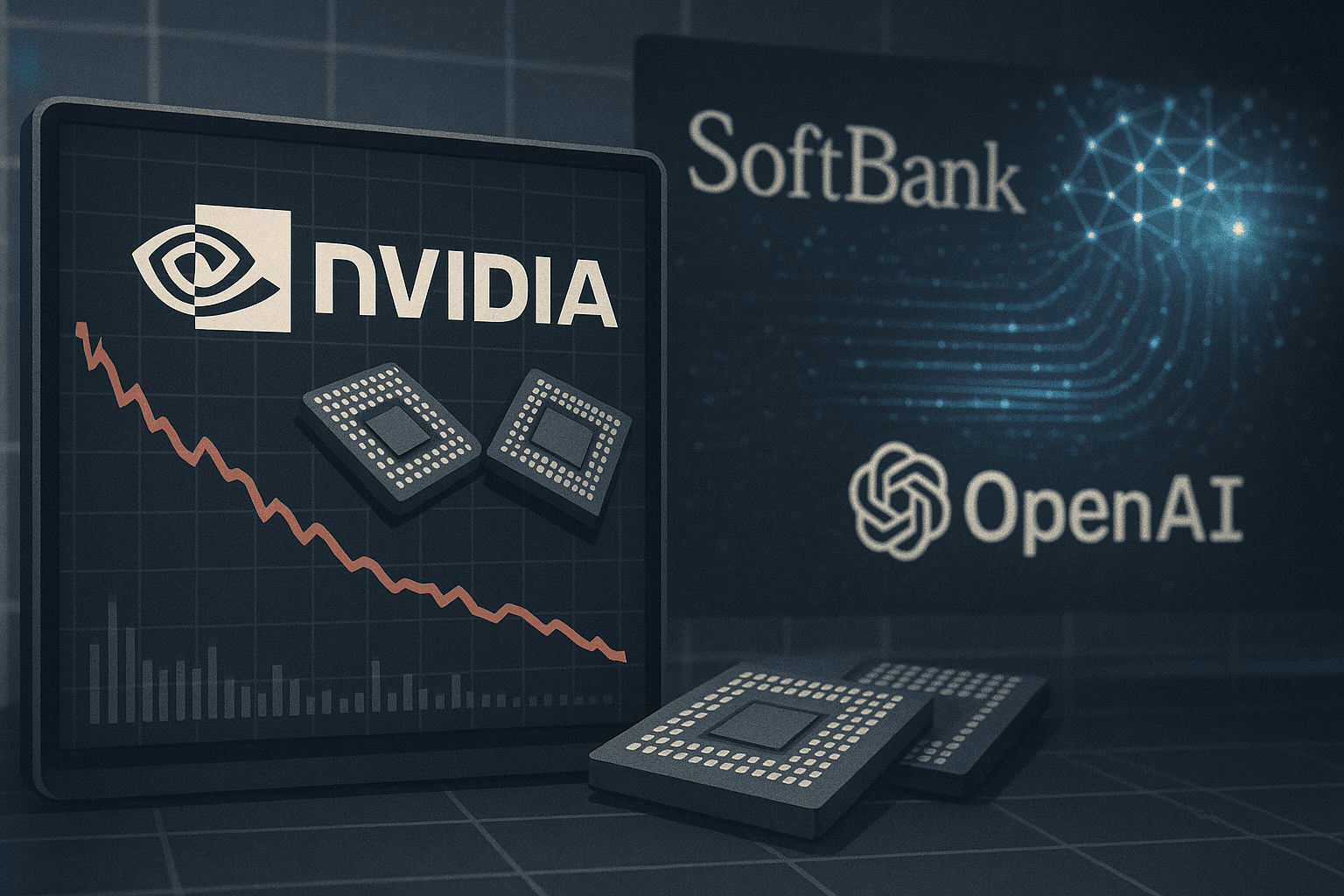Nvidia stock slip after SoftBank sells $5.83B stake to fund OpenAI bet

News Summary
Nvidia's shares fell 2.3% to $194.43 after SoftBank Group disclosed it sold its entire $5.83 billion stake in the chipmaker in October 2025. The sale occurred ahead of Nvidia's November 19 earnings report and fueled debate about stretched valuations across the artificial intelligence sector. Despite SoftBank's exit, Wall Street analysts remain optimistic about Nvidia's near-term prospects, with UBS maintaining a “Buy” rating. Analysts anticipate the upcoming earnings call will focus on the speed of AI infrastructure installation and potential customer concentration risks. SoftBank CFO Yoshimitsu Goto stated the sale was unrelated to Nvidia itself, but rather to fund its massive investment in OpenAI, including leading a $40 billion investment and partnering on the $500 billion “Stargate” AI infrastructure project. SoftBank's net profit more than doubled, fueled by the revaluation of its OpenAI stake, and its shares have also doubled this year. This shift underscores the evolving AI arms race, where long-time partners may soon become rivals in the next phase of the semiconductor and AI infrastructure battle.
Background
SoftBank Group was once among Nvidia's largest shareholders and had even offered to help CEO Jensen Huang take the company private. However, founder Masayoshi Son gradually reduced his position, missing out on potential gains worth hundreds of billions of dollars as Nvidia's stock skyrocketed during the AI boom. Nvidia is a leading global AI chip manufacturer, dominating the data center and AI computing sectors. Driven by surging AI technology demand, Nvidia's revenue and stock price have seen significant growth in recent years. Simultaneously, OpenAI, the developer of ChatGPT, has made waves with its generative AI technology, attracting substantial investment and being recognized as a crucial component of future AI infrastructure.
In-Depth AI Insights
Does SoftBank's aggressive investment in OpenAI signal a fundamental shift in the AI value chain? - Yes, this likely indicates a significant shift. SoftBank's actions suggest it believes the next frontier of AI value creation may be moving from foundational chip hardware to higher-level AI applications, model development, and infrastructure services. By investing heavily in OpenAI and the “Stargate” project, SoftBank is positioning itself as a critical player closer to the application layer in the AI ecosystem, rather than solely a financial investor in hardware providers. - This strategy reflects a view that as the AI chip market matures and potential competition intensifies (e.g., between Intel and Nvidia), higher margins and strategic control might reside in AI software and services. SoftBank, already having hardware influence through ARM and potential chip design ventures, is now seeking dominance in the software and application layers through OpenAI, aiming to build a more comprehensive AI industry footprint. What are the long-term implications of SoftBank's Nvidia stake sale for Nvidia's market narrative and investor sentiment? - Although SoftBank's stake sale is small relative to Nvidia's massive market capitalization, and analysts generally remain optimistic, this move could subtly impact the market narrative long-term. It might be interpreted that even long-term investors are seeking higher-return alternatives amid the AI valuation “bubble” discussion. - It could prompt investors to more rigorously scrutinize Nvidia's growth drivers, such as customer concentration risks and challenges in AI infrastructure deployment, rather than just chip demand. Furthermore, SoftBank, as an early and deep tech investor, shifting from a long-held chip giant to emerging AI infrastructure could be seen as a strategic vote on the future direction of the AI industry—moving beyond pure hardware sales to more complex AI services and ecosystem building. Considering the incumbent Trump administration's